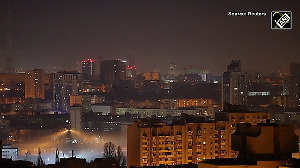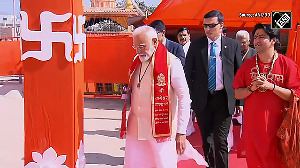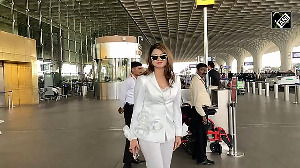Families of two astronauts from Kalpana Chawla's final space mission on Monday spoke to schoolchildren at Mumbai's Nehru Centre.
They also presented the Nehru Planetarium with a set of DVDs on Chawla, and a rare montage of photos personally signed by the crew of the STS-87, Chawla's previous space mission.
The Columbia Shuttle Crash: The Complete Coverage
Chawla's husband, Jean-Pierre Harrison, was not present.
Rona Ramon, wife of payload specialist Ilan Ramon, said Chawla had plans to return to India and distribute mission materials.
She said the crew's message to the children was, "Reach for your dreams, accomplish your potential, and we will get to peace."
Also with Ramon was Rosalind Hobgood, STS-107 (Columbia shuttle) crew secretary and Atilana McCool, wife of pilot William McCool, along with her son Cameron.
Ramon said Chawla and her husband would often host the crew and their families, making them Indian food and sharing recipes.
"JP and Kalpana shared your culture with us," she said.
Ramon said she had just found out that Kalpana's name meant imagination, and the fact that she chose that name for herself at the age of five "says so much about her spirit and what she can do".
Hobgood also had fond memories of Chawla and "these wonderful people who just so happen to be astronauts".
"Although she (Chawla) was small in stature, her intelligence and kindness were huge," she said.
Chawla was known as an "encyclopaedia", said Ramon. "She knew everything and she would be ready for every situation."
She would often take care of details and facts, so the others could spend more time with their families, Ramon added.
McCool, a photographer and artist, remembered Chawla as someone who was more organised at note taking than her meticulous husband.
"She would study with my husband and then do poetry with me," she said.
Hobgood said if Chawla were here right now, she would probably be laughing at all the attention paid to her by the media.
Chawla disliked attention, which Hobgood said was because "she knew who she was, so she didn't need the spotlight on her".
Speaking to children in India was something she wanted to do, said Ramon.
"She wanted to spread her mission to other kids," she said, "so I am sure she'd want us to spread the mission."
The crew was planning on speaking to children across the world, said Ramon. "It is a tough position," she said. "We all know and feel that they are the real stars and not us, and we feel it."
McCool said she had been less public than some of the others, but wanted to come to India because she knew how important it was for Chawla to come back and spread the message to students about achieving their dreams. "She loved the feeling of soaring."
Ramon deflected questions to the families about NASA and the Columbia shuttle crash. Asked if they were angry with NASA, Ramon said, "We cannot change what happened and we hope they can learn from this."
She also fielded a question about the results of a NASA investigation, saying, "since I am not a scientist, I cannot agree with the findings or not."
The STS-107 broke-up over Texas during re-entry on February 1, 2003.
Hobgood said she learned a lot from watching the astronauts work together, despite religious and cultural differences. "It was wonderful to watch them come together as a team and also accept me as a part of that," she said. "They had more than being an astronaut, they had family values."
Hobson said watching them made her realise that "if you put away personal egos and work as one, you can achieve anything".
Chawla embodied that. In a video presentation of an interview before her mission, Chawla quoted her favourite saying by the philosopher Seneca: "I was not born for one corner, the whole universe is my land."






 © 2025
© 2025